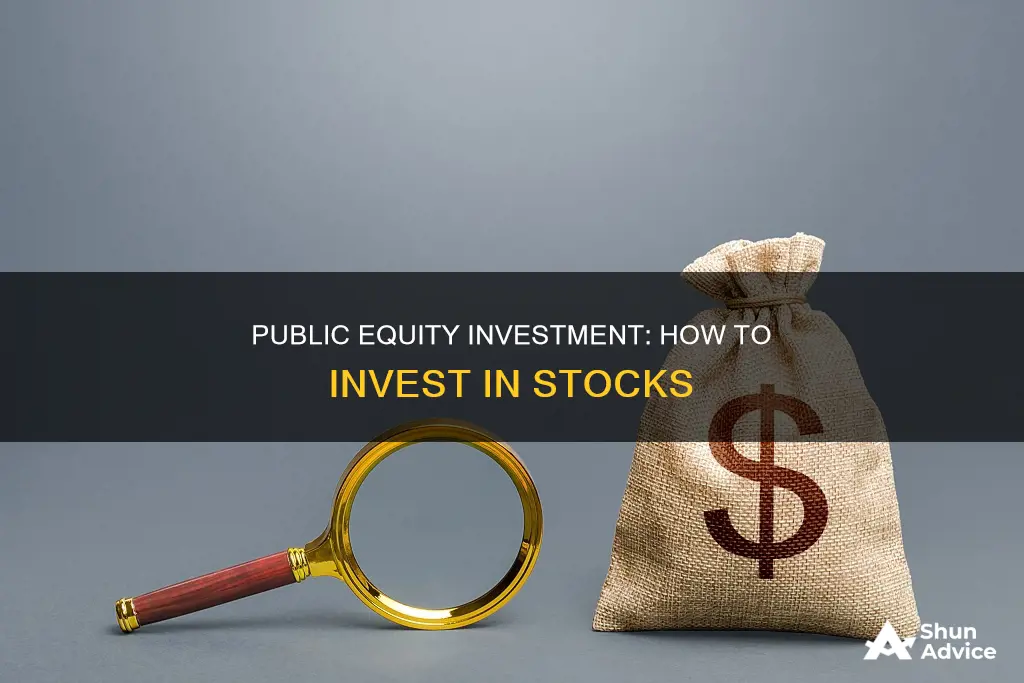
Public equity involves investing in publicly traded companies, offering liquid assets through easily tradable shares. It is also known as public stocks or equities and refers to ownership shares in companies that are publicly traded on stock exchanges. When a company goes public, it offers a portion of its ownership to investors through an initial public offering (IPO), allowing them to buy and sell shares on the open market. Public equity shareholders can be individuals, institutional investors, mutual funds, hedge funds, and other entities. They have voting rights and may receive dividends, which are distributed as a portion of the company's earnings.
| Characteristics | Values |
|---|---|
| Definition | Public equity involves investing in publicly traded companies |
| Publicly traded companies list their shares on stock exchanges such as the New York Stock Exchange (NYSE), Nasdaq, London Stock Exchange (LSE), and Tokyo Stock Exchange (TSE) | |
| Type of investor | Available to individual and institutional investors |
| Liquidity | Highly liquid. Shares can be bought and sold easily during market hours |
| Accessibility | Easily accessible through a brokerage account |
| Transparency | Transparent. Stock prices are determined by market forces based on supply and demand |
| Disclosure requirements | Public companies must regularly file financial reports and disclosures with regulators (SEC, etc.) |
| Risk | Risk levels vary across individual stocks, though can be mitigated through diversification |
| Returns | Returns are tied to overall market performance and individual stock choices |
What You'll Learn

Public equity is a stock that is bought and sold through a public market
Public equity is accessible to a broader range of investors compared to private equity, which is geared towards sophisticated investors with specific minimum net worth requirements. Publicly traded companies must disclose financial information, operating performance, and material developments to shareholders and the public, allowing for greater transparency and informed investment decisions.
Public equity shareholders are entitled to part of the company's earnings and assets, and they may receive dividend income, which is a portion of the company's earnings distributed by the company's board of directors. It's important to note that public equity investments come with risks, including market risk, business risk, and liquidity risk.
One notable aspect of public equity is its liquidity. Most publicly traded stocks are available for trading daily on public market exchanges, making it convenient for investors to buy and sell stocks quickly and access their capital.
Public equity markets are also subject to regulation by government agencies, such as the Securities and Exchange Commission (SEC) in the United States, to ensure transparency, fairness, and investor protection. Companies offering public equity must adhere to strict disclosure requirements and financial reporting standards to maintain their listing status.
Equity and Investment: What's the Real Difference?
You may want to see also

Public equity is widely accessible to investors
Public equity is accessible through a brokerage account, and investors can buy and sell shares at any time during market hours, providing immediate liquidity. This is in contrast to private equity, which is less accessible to average investors, as it is made through funds with high investment minimums. Private equity investments are therefore less liquid, and investors may hold them for years before an exit event, such as an IPO or acquisition.
Publicly-traded companies must also disclose financial information, operating performance, and material developments to shareholders and the public, meaning that public equity is a more transparent investment. This transparency facilitates informed investment decisions and fosters market efficiency.
Public equity is also highly regulated by government agencies such as the Securities and Exchange Commission (SEC) in the United States, which further protects investors. These regulatory bodies ensure transparency, fairness, and investor protection, and companies must adhere to disclosure requirements and financial reporting standards to maintain their listing status.
Overall, public equity is widely accessible to investors due to its availability on public markets, liquidity, transparency, and regulatory protections.
Investing in Indian Fixed Deposits: A Guide for US Residents
You may want to see also

Public equity is highly liquid
The liquidity of public equity also means that it is accessible to a wider range of investors. While private equity investments are often only available to institutional investors or high-net-worth individuals, public equity is widely accessible to individual and institutional investors through stock exchanges.
Publicly traded stocks are also easily traded daily, making them a viable option for most types of investors. In contrast, investors may hold private equity investments for years before an exit event, such as an initial public offering (IPO) or acquisition.
The high liquidity of public equity is further enhanced by the transparency of stock prices, which are determined by market forces of supply and demand. This transparency facilitates informed investment decisions and fosters market efficiency.
Additionally, public equity markets are subject to regulation by government agencies, such as the Securities and Exchange Commission (SEC) in the United States, which ensures transparency, fairness, and investor protection. These regulatory safeguards contribute to the overall liquidity and accessibility of public equity investments.
BlackRock's Investment Strategies: Exploring India's Potential
You may want to see also

Public equity is subject to regulatory scrutiny
Publicly traded companies are required to disclose financial information, operating performance and material developments to shareholders and the public. This transparency enables investors to make informed decisions and promotes market efficiency. Regulatory bodies such as the Securities and Exchange Commission (SEC) in the United States oversee public equity markets to maintain order and protect investors. Companies must adhere to strict disclosure requirements and financial reporting standards to maintain their listing status.
The regulatory environment for public equity varies across countries. For example, in the United States, Australia, Canada and the United Kingdom, the regulatory framework is accommodating for transactions such as Private Investment in Public Equity (PIPE). PIPE transactions involve the selling of publicly traded common shares or preferred stock to private investors, often at a discount. While PIPE deals can provide quick access to capital for companies, they can also be highly dilutive to existing shareholders.
In contrast, private equity involves investing in private companies that are not publicly traded on stock exchanges. Private equity investments are subject to less regulatory oversight and have more limited disclosure requirements, offering more confidentiality. Private equity firms often aim for significant ownership stakes and actively manage the companies in which they invest to increase their value. Due to the higher risk and limited liquidity of private equity investments, they are generally suitable for more sophisticated investors.
Overall, public equity is subject to greater regulatory scrutiny than private equity due to the public nature of the investments and the need to protect a wider range of investors. Regulatory bodies play a crucial role in ensuring transparency, fairness and investor protection in public equity markets.
Brexit-Proof Your Investment Portfolio: Strategies for Volatile Markets
You may want to see also

Public equity is subject to market volatility
Market volatility presents both opportunities and risks for investors in public equity. On the one hand, investors can take advantage of market fluctuations to make profitable trades. On the other hand, there is a risk of financial loss due to systematic risks, such as economic downturns or stock market crashes, and unsystematic risks, such as company-specific issues or scandals.
The volatility of public equity prices is influenced by supply and demand, with various factors impacting the decisions of buyers and sellers in the market. For example, positive economic conditions, strong company performance, and favourable market sentiment can lead to an increase in demand for stocks, driving up prices. Conversely, negative events or poor company performance can cause a decrease in demand and a corresponding drop in stock prices.
Additionally, public equity is also subject to regulatory scrutiny, which can impact market volatility. Publicly traded companies are required to disclose financial information, operating performance, and material developments to shareholders and the public. This transparency allows investors to make informed decisions and promotes market efficiency. However, it also means that any negative news or disappointing financial results can quickly lead to a decline in stock prices as investors react to the disclosed information.
Overall, public equity investors need to be aware of the potential for market volatility and the associated risks. By understanding the factors that drive market fluctuations, investors can make more informed decisions and implement risk management strategies to protect their investments.
Who Is an Institutional Investment Manager and What Do They Do?
You may want to see also
Frequently asked questions
Public equity involves investing in publicly traded companies, offering liquidity through easily tradable shares.
Private equity involves investing in private companies that are not publicly traded on stock exchanges, while public equity involves investing in companies that are publicly traded on stock exchanges. Private equity investments are less accessible to average investors and involve larger capital commitments, longer investment horizons, and more active company management involvement.
Public equity investments are accessible to a wider range of investors, offer higher liquidity, and are subject to regulatory safeguards. They also provide the opportunity for investment gains and dividend income.
Investing in public equities through the stock market carries various risks, including market risk, business risk, and liquidity risk. Market risk refers to the potential for financial loss due to factors affecting an entire market or asset class, such as an economic recession. Business risk relates to financial loss associated with specific companies, such as lower-than-expected earnings. Liquidity risk refers to the variable ease of buying and selling stocks for different companies and exchanges.
Examples of public equity investments include common stock, preferred stock, mutual funds, exchange-traded funds (ETFs), and initial public offerings (IPOs). Common stock gives shareholders voting rights, while preferred stock usually guarantees a dividend payment.







